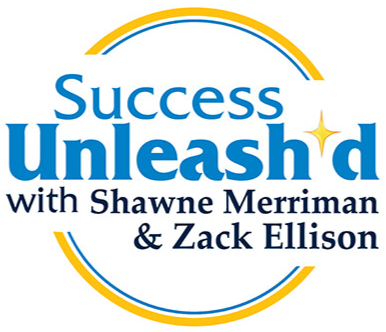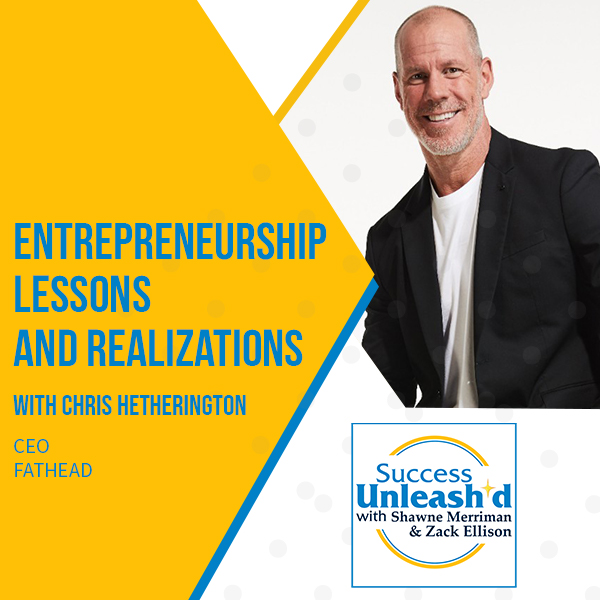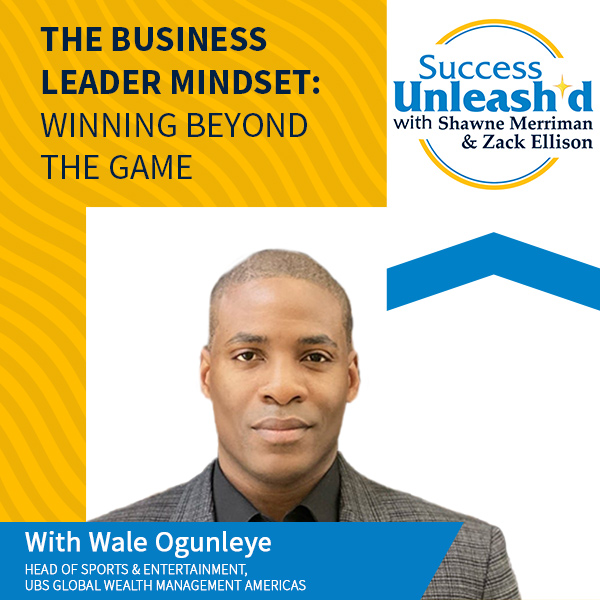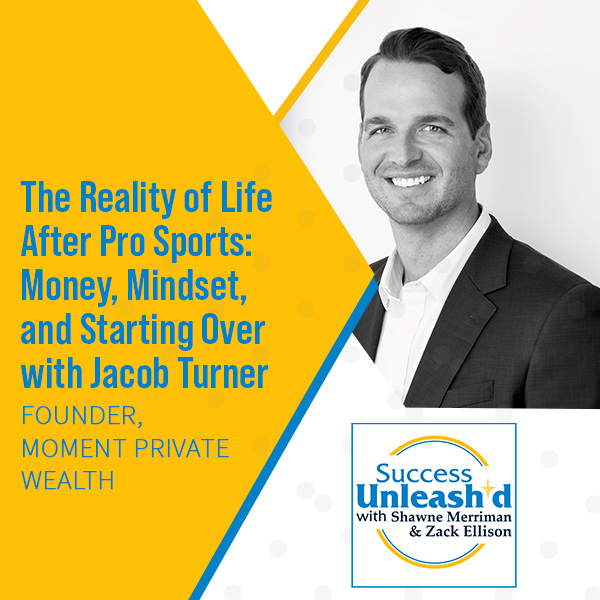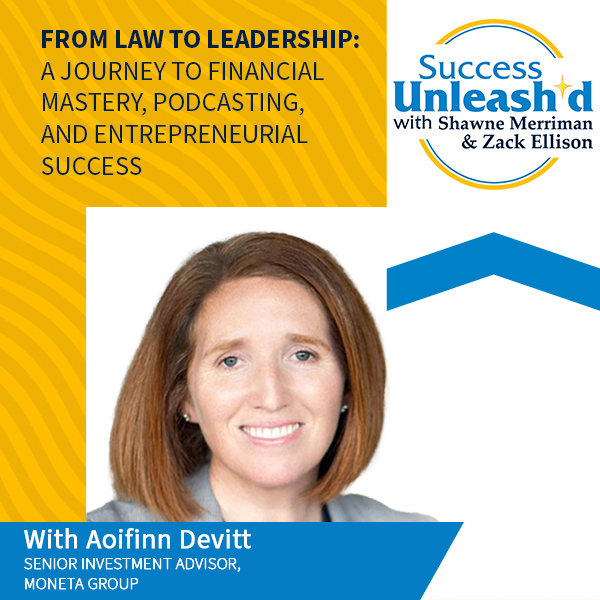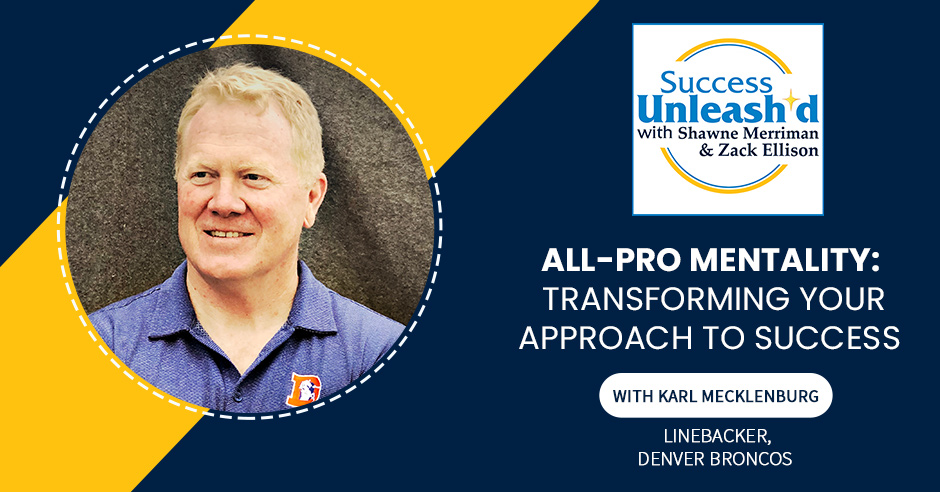
Welcome to another episode of Success Unleash’d with Shawne Merriman and Zack Ellison. In this episode, we’re joined by legendary former Denver Broncos linebacker, Karl Mecklenburg. A six-time Pro Bowler and four-time All-Pro, Karl’s journey from being the 310th pick in the NFL Draft to becoming one of the most dominant defensive players of his era is a testament to resilience, adaptability, and relentless hard work. Now a sought-after keynote speaker, Karl shares his insights on leadership, high performance, and overcoming obstacles—both on and off the field. Get ready for a conversation packed with wisdom, grit, and the principles of success that you can apply to your own journey.
Success Unleash’d Principles From This Episode
1. Preparation Fuels Decisiveness
Karl emphasizes that preparation is the foundation of success. When you put in the work upfront, you can make quick and confident decisions that give you an edge over the competition.
2. Embrace Change to Grow
Karl transitioned across multiple positions before finding his true calling as a linebacker. Success requires adaptability—being open to new opportunities can lead to unexpected greatness
3. Obstacles Are a Sign You’re Pushing Hard Enough
If you’re not facing challenges, you’re probably not pushing yourself hard enough. Every obstacle is an opportunity to grow and improve.
4. Work Ethic Trumps Talent
Karl wasn’t the fastest or strongest player, but his relentless work ethic set him apart. Success isn’t just about talent—it’s about consistent effort and discipline.
5. Control Your Response to Adversity
Injuries, setbacks, and tough breaks happen. What matters most is how you respond. A positive mindset and perseverance can turn challenges into stepping stones for success.
6. Seek and Accept Feedback
Great leaders and high performers aren’t afraid of constructive criticism. Evaluate honestly, adjust accordingly, and always strive to improve.
7. Authenticity Builds Lasting Success
Karl stresses the importance of being genuine. Whether in sports, business, or life, people connect with and trust those who are authentic.
8. Consistency Creates Longevity
Sustained success comes from showing up every day, putting in the work, and maintaining a high standard—whether it’s in the NFL, business, or personal development.
9. Success Requires Sacrifice
Whether it’s extra time in the gym, studying film, or honing your craft in business, success comes with sacrifice. The best are willing to do what others won’t.
10. Surround Yourself with the Right People
Karl credits his growth to great coaches, teammates, and mentors. Success isn’t a solo journey—seek out those who challenge and inspire you.
—
Watch the Episode Here
Listen to the Podcast Here
All-Pro Mentality: Transforming Your Approach To Success With Karl Mecklenburg
We have with us Karl Mecklenburg, who is one of the all-time greats on the defensive side of football. He was a six-time Pro Bowler for the Denver Broncos and did that after being the 310th pick in the draft. He then went on to a very successful off-the-field career and is now a keynote speaker, speaking over 40 times a year to businesses all over the world. Karl, thanks a lot for joining.
It’s my pleasure, Zack.
I said you were All-Pro, but Pro Bowl and All-Pro are slightly different.
I was All-Pro four times. I was Pro Bowl six times. You have to be in the right place at the right time to get those accolades. We had a great team. We could take a lot of chances. Other defenses couldn’t take it because we knew if it was close to the end, John Elway and that group were going to win the thing. It was a blast. I love playing football.
I’m sure you’re looking at the Pro Bowl now as many of us do. It’s not the same. It’s not the same when you made it six times and what the Pro Bowl is now.
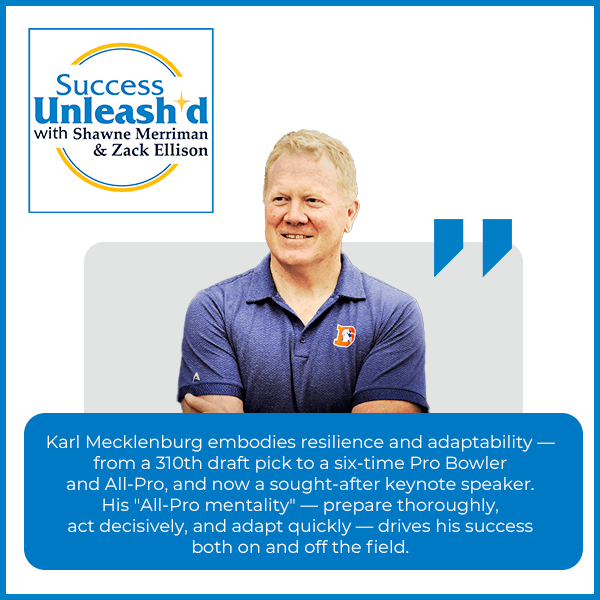
They paid you $5,000 if you lost and $10,000 if you won. My family had already spent $10,000, so I was trying to win. It was a different deal.
Zack, before you jump in it, in the first half of the Pro Bowl, people are out there sitting in Hawaii. This is back when you guys were in Hawaii. You guys were playing too. It was all fun and games. You spend a week of practice most of the time having Mai Tai and drinks by the pool, kicking it with your family, and hanging out.
By the time you get to the game, it’s okay. You’re trying to play. You get your money. You flew everybody else back out there and whatever money you spent, having a good time in hotels and everything else. In the second half of that game, people realized that $5,000 jumped to $10,000. For us, that’s $20,000 jumped to $40,000. It got dead serious. Tell me how that game was when you guys were playing.
I remember tackling Walter Payton in that game. I’m on top of Walter Payton and he’s throwing his elbows and knees. He was like, “Get off me.” I was like, “We’re in Hawaii. This is supposed to be fun.” It was a good time. The great thing about that game is, and people don’t realize this, as a professional football player, you fly in the night before the game and you’ve got a meeting every 2 or 3 hours. You don’t have any time to meet the guys on the other teams. As soon as the game’s over, you fly home. This is an opportunity at the Pro Bowl to get to know people, spend some time with people you respect their game, and get to know them. For me, that was the greatest thing about the Pro Bowl. I got to become good friends with Junior Seau and a number of other guys, but particularly with Junior.
Overcoming The Odds: Low Draft To Success
I wanted to ask you. You are a relatively low draft pick.
Twelfth round. Last. I was twenty guys away from Mr. Irrelevant.
People think Tom Brady was a late-round pick. You were picked over 310 picks later. How did you go from that to becoming one of the best defensive players for over a decade?
I’ve thought about that. I loved the game. I wanted to play the game. I was out of position more than anything. I was drafted as a nose guard. A 240-pound nose guard, even back then, was too small. I got injured. They moved me to the defensive end because I couldn’t lock my arm out. I made the team as a third-down pass rusher and a special teams player.
Three years in, the coaches came to me and gave me one of the best questions I’ve ever been asked, and that was, “Karl, we love what you’re doing as a third-down pass rusher and a special teams player, but we think you can help the team more as a linebacker.” I’d never played linebacker in my life, but I said, “Let’s give it a shot.” I made the Pro Bowl as a linebacker that year. That’s where I was supposed to be.
Football Lessons For Business Success
I don’t know if you had this as an athlete, but getting into more business and more in the business world, it used to bother the heck out of me that people would always bring up these football analogies. They were like, “You’re an athlete. You don’t understand what we’re talking about, so we got to use a fourth and goal, a third and long, or a turnover on downs.” It was always this football analogy that was happening in the boardroom meetings that I went to.
Over time, I started to see that football was so similar to business, life, and everything else. It sounds like, to me, a big reason why you had success after you got done playing is because you understood what it took from moving from nose guard to D-end to being a late-round draft pick. You understand the work. How did the football part of your life help the second act?
I like to call it an All-Pro mentality. Prepare thoroughly, perform decisively, evaluate honestly, and adjust accordingly. If you can’t do that in the NFL, you’re not going to have success. You’re not going to move forward. If you can’t do that in business, same thing. I get up every morning, do a little Bible study, think about who I’m going to run into that day and how I can make a difference in their life, and I evaluate afterward. I make sure that if adjustments need to be made, I make them.
That honesty and forgiveness piece is the one that most people miss. There’s no question in the NFL. You’re sitting in the meeting room with the other players and the coaches are playing the plays back and forth in front of you and everybody. There’s no hiding from the eye in the sky. You did what you did. In reality, it’s the same in business. You did what you did. If it didn’t work, throw it out. Do something different and get better. To me, that drive to get better that I took away from football has helped me tremendously as a professional speaker.
Breaking Down The All-Pro Mentality
Break down some of those All-Pro mentality attributes that you talked about because you’re onto something here.
Prepare thoroughly, that piece of it is huge to go into a situation with the confidence that you have prepared. The hay is in the barn. I can let go and be myself. I can be decisive. That decisiveness piece is what made my career. I was the 310th pick of the draft. I was not somebody anybody expected to make it. I ran a 4940. I wasn’t even invited to the combine. There was a combine back then, but I wasn’t invited to it. I was drafted late.
I found out early on in my career that if I took the first step in the right direction before anybody else did, all the angles would change in my favor. The tight end couldn’t pin me in. The guard couldn’t cut me off. The fullback couldn’t keep me from getting to the line of scrimmage. Everything changed. That’s true everywhere. If you’re prepared and you go into a situation, and you’re decisive, then you can take that step before anybody else does. You can be the first one at the table. To me, that’s huge.
If you're prepared and decisive in a situation, you can act before anyone else, allowing you to be first at the table. Share on XI want to ask him something off of that, Zack. I was fortunate. I was drafted in the first round. I was the twelfth overall pick by the Chargers. The mentality is a little bit different. I would still work my butt off. I was constantly working. I never took plays off. If anybody popped any film of me in my entire career during a game, you’ve never seen me loafing it, dogging it, jogging around, or not going to the football. You have some of these first-round guys who are poking their chests out, don’t want to work, and are relying on talent. Could you talk a little bit about your mentality? Since you were drafted late and you had to do things other guys didn’t when they were drafted earlier, how did that benefit you in the long run?
I didn’t have any expectations. I didn’t understand that I didn’t belong, but I was going to work. I was going to play football. I love playing football. All that moving around from position to position was mentally challenging, but as far as the physical challenge of the game, it’s defeating blockers, taking the right angle to the ball, and making a tackle. That’s what I was doing. It didn’t matter if I was a nose guard. Every time we played a run-and-shoot team, I was a nose guard. If I was a defensive end in a passing situation, I was inside or I was outside moving around. It’s the same deal. Get rid of the blocker and go to the ball.
People complicate things too much to be a good team player. I’m not talking about football, but a team player in business, a team player in your family, and a team player in your community. It’s about being prepared, going into situations, and being decisive. When there’s a decision to be made, make it. Go, especially in football but anywhere else, too. If you don’t go, you’re late. It’s done.
What I like about what you’re saying, Karl, is that it’s preparation that enables you to be decisive and effective in being decisive. If you’re not prepared, then you’re winging it. That’s not being decisive. That’s being sloppy and you’re probably going to lose most of the time. When you put in the work in advance, that’s what enables you to make better decisions when it counts. I love that point because I don’t think people always connect the dots there. To be someone who it seems that things are coming naturally to them, that’s because you’ve put in the work. It’s like both of you guys and the Tom Bradys of the world.
When I think about decisiveness for the Denver Broncos, it was Peyton Manning. Peyton came to the Broncos with a broken neck. He could throw the ball about twenty yards and his hand was numb but he was decisive. I don’t know if you heard his retirement speech, but he went back to it at least ten times, “Nobody’s going to out-prepare me.” He said that over and over. That was his life.
The first time I met him was at a golf event at the Super Bowl. They hold these things every year with paid attendance and retired players. Peyton came up to me before this. He was a kid who had graduated from college. He was out of Tennessee. They asked him to be a part of this. He came up to me like, “Mr. Mecklenburg, I love what you did for the Broncos. You had over 1,000 tackles. You had more sacks than anybody in the history of the team. You were All-Pro. You were this. You were that,” and then he started talking about my University of Minnesota career.
Peyton Manning was two years old when I played at the University of Minnesota. He didn’t see me play. What he had done is he had gone down to a library, because there was no Google back then, and studied up on the guys that were going to be there. That was Peyton. He was going to be prepared for any situation he was in. When I think about recent players, Peyton is the guy that comes to mind for me.
I want to give a good Peyton story off of that. We talked about the Pro Bowl. When you get down to the Pro Bowl, everything is fun and family. You’re practicing an hour a day and mostly walkthrough type of stuff. We stayed at the Ko Olina Hotel in Waikiki. There was a gym right across the street from the hotel. I would go there a couple of days a week. I would pop in there and do some curls. We’re in Hawaii. I’m not doing real workouts. I just want a nice pump so I can throw some oil on my arms and look good in practice.
When I walked into the gym one day, Peyton was on a leg press machine. He had about 600 or 700 pounds in there doing a leg press during the Pro Bowl. I’ll never forget it. One, at the quarterback position, you don’t expect that. Two, you saw that he had a different mentality than everyone else. When I saw and got a chance to be around him that week and talk to him, Peyton was the first player that I’ve ever asked for an autograph from.
You see him on TV. You see him during the games. I tore him up in my rookie year. I got 3 or 4 sacks against him in one of the games. I went over to him and talked to him. I’ve seen the way he communicated with everybody by the pool and how he made everybody feel comfortable. That day when I walked into the gym and saw him in a leg press machine during Pro Bowl week, it completely changed my mentality and how I looked at Peyton from that point on.
He is a special player. It was all about preparation and decisiveness for him. No question. Have you seen him run regardless of how much weight he can lift? He’s not the greatest athlete. He worked at it so hard.
Karl, it worked out great for me because I was glad he couldn’t run. That’s why I got so many sacks on him when I finally got to them. I was glad he couldn’t run.
Karl, you were talking about Peyton’s neck injury and injuries that you had coming out early. Shawne had a bad knee injury. You guys have all overcome these injuries. It makes me think about this idea that you can’t control what happens to you but you can control how you respond to it and your attitude. To me, that’s one of the keys to being successful. It is figuring out how you can have a positive attitude, keep moving forward, and not let events dictate things. What’s great about it is you can control it. The one thing that’s in your control no matter what is how you respond. One is going to force you to respond a certain way. It doesn’t matter if you’re in prison. You respond a certain way.
To me, that’s what success is. It is overcoming obstacles on the way to your dream. Truthfully, if you’re not running into obstacles, you’re not pushing hard enough. You should run into obstacles. There should be challenges in your life. That’s a good sign. That means you’re on the edge. If you want to be successful or more successful than you are, that’s the only place it’s going to happen.
Success is overcoming obstacles on the way to your dreams. If you're not running into obstacles, you're not pushing hard enough. Share on XWhen you talk about the obstacles and injuries, back when you were playing, I’m sure the training rooms looked a lot different. The medical care looked a lot different than how they are taking care of some of these guys now. When I talk to a lot of guys that played before me and around that time, I have so much respect for them because you could not go about it a different way.
If you talk about the NBA, these guys are taking management. Mental health and all that stuff is important. I’m not saying it’s not, but it was a different mentality then. I appreciate it when I talk to the older guys, guys who played before me, and how that mentality was created then and how you’ve been able to use that to life now.
Shawne, my job was to play football. I was going to play football until my coach thought that my backup was better than me. That means if I’m injured, if I get a migraine if my wife is having a baby, or whatever. I’m a professional football player. That’s my job. That’s how I approached it. I approached speaking the same way. I don’t miss the speaking engagement. It doesn’t matter what’s going on. I’ll figure out a way to get there, whether it is driving ten hours or whatever it takes. I’ll get there.
Redefining Success As You Get Older
As you’ve gotten older, has your definition of success changed?
I don’t think so. I did not have the silver spoon football life, but I did personally. My dad’s a doctor. I grew up in a very different situation than many professional football players. I had to work at football. As a junior in high school. I played JV. I didn’t even make the varsity team. I went to Augustana College in Sioux Falls, South Dakota, a little Division 2 school, for two years, and then they took away my partial scholarship. I left there and walked on to the University of Minnesota. I earned a scholarship there after working at it as a walk-on.
I was very fortunate. Tony Dungy was a graduate assistant and was working with me. Mike Shanahan was the offensive coordinator of that team. Mike Martz worked in the film room. We had unbelievable coaching. I learned how to play football there and brought that with me as a twelfth-round draft pick. I get to training camp my rookie year and my number’s the same number as a starter. They had 110 guys out of training camp. That’s never a good sign when your number is the same as a starter.
During my first week of training camp, I tore a hole in one of my socks. I went to the equipment manager for a new pair of socks and he said, “What’s the matter with the other sock?” He only gave me one sock. That’s where I stood when I got there. I had to overcome. To me, that’s what success was. If you’re not bumping into obstacles, you’re not pushing hard enough.
A lot of times when people start businesses, they are doing certain things that they necessarily don’t want to do. I always say, “Do what you have to do so you can do what you want to do.” It sounds like a lot of that happened with you. You had a destination. You had a goal. You had a place you wanted to get to. If they asked you to play nose tackle even though you didn’t want to, you did it. You ultimately had a goal and an end goal. How has that formed how you took towards business, speaking, and everything else?
For me, having an extravagant, long-term, somewhat general desire, passion, and mission was what got me through the tough times. My desire, my passion, and my mission was, “I’m going to be the greatest football player that ever played the game.” I made decisions around that, whether it was hitting the weight room when I didn’t want to, studying film, or doing whatever it took to get better every single day.
For me, identifying your desire, passion, and mission gives you a chance to get there. You’re not going to accomplish great things if you don’t believe you can. If that’s not something that you’re shooting for, there are all kinds of other people shooting for the same stuff. It’s not going to happen unless it’s in the front of your mind when you’re making decisions. For me, that was it.
I’m 64 years old. I can’t play football anymore. I’m not Tom Brady. I got things going on. My desires, passions, and missions are still there. As a husband and a father, I want to give unconditional, uncompromising love to my family. As a speaker and an author, I want to inspire long-term positive change. That’s who I am. That’s who I’ve decided I’m going to be. If I find myself drifting away from those things, I know it. I can set goals and get back to where I want to get to.
Getting Unstuck: Habits For Overcoming Challenges
How do you get unstuck if you’re in a position where there’s something that’s not going your way, what are the habits or what’s the mindset that helps you get through that? What can others take away from that?
Honesty and forgiveness more than anything. Looking at yourself and knowing that you’re stuck is the first step. A lot of people won’t admit that they’re stuck. They don’t believe that they’re stuck. They think, “It’s bad luck,” or whatever. For me, it’s admitting that there’s a problem and then finding out how to fix it.
I am a member of the National Speakers Association. I have friends. I have acquaintances. I have two new friends that I can reach out to and say, “I’m having this problem. What would you suggest I do?” Rather than turtling, sucking your head in, and disappearing, when you find that you’re stuck, the best thing to do is to talk it over. Find a way around it. Accept other people’s opinions and not say, “This is how it’s always been so this is how it’s always going to be.”
When you're stuck, the best thing to do is talk it over, find a way around it, and accept other people's opinions. Share on XChange is hard. Everybody who deals with change struggles with it. It’s not an easy thing, but the way you move forward in life is through change. Progress is always changing. Even though it was difficult, it was tough to retire. I’m sure Shawne went through the same thing. It’s tough because you’ve spent your whole life trying to get into a certain position in football. You get there and then the wheels start coming off and it’s time to leave. It’s a hard thing but there’s always opportunity and change. Progress is always changing. Look at it that way. Figure out a way to make some changes.
Adapting To Life After Football Retirement
Speaking of change, that’s something I want to ask you about. You talked a little bit about retiring and how hard it is. I went right into TV. My first job was with the NFL Network. I signed a couple of years contract with them. I would have plenty to do. There were still some days that I sat around like, “This is it.” I had plenty to do. How did you switch your mentality to identify what was the next phase of your life? For me, it took me a good two years to say, “I’m done. I’m not a football player anymore.” Even though I had all this great stuff going on, it took me a while to let the game go and completely identify as something else.
I was right with you there, Shawne. I remember two years out from football, I was going to get back in shape a little bit. I ran a ladder. That’s when you go 10 yards and walk back and do that all the way out to 100. I was laid up for a week and a half. Any idea of, “I could play again,” was gone. You have to have that time. I don’t know about your experience, but my experience of guys who started their next career before they retired from football, their football career was shortened because of it. If you’re going to be the best of the best and be a professional football player, that’s got to be it.
For me, going into that retirement time, I already had decided I wasn’t going to set something up. There’ll be time. It took me some time. I helped coach my son’s high school football team. I went fishing. I did some stuff that I wanted to do. Eventually, opportunities came up to speak and I loved it. It was so much like football. I know it’s funny to think that way but you’re prepared, depending on the opponent or the client.
You perform at a high level for a short period of time, evaluate what went on, throw out what didn’t work, repeat what worked, and get ready for the next one. It was football except I never got hurt. It was good stuff. I still love it. Passion and adrenaline, of all the things that I miss from football, are the two that I miss the most. When I get up in front of an audience, whether it’s 50 people or 2,000, I get that adrenaline. That’s hard to replicate.
Misconceptions About Success And Hard Work
When people think about success, they often look at those who are on TV and have a big media presence. A lot of times, those are personas. A lot of it’s not true, in a sense. In terms of what you’re seeing is carefully manufactured, in a sense. This is a question for both of you guys. Are there things about successful people that you don’t see?
Are there myths about success that are total BS, where you look at that and you’re like, “That’s not how it is behind the scenes?” You guys have both been successful off the field. I work very closely with Shawne so I know the work that he puts in. I don’t think people understand how hard it is. I wanted to see if you guys had other things that you’ve noticed where there are misconceptions about what successful people do.
There’s a myth that nothing has ever gone wrong for a successful person. You look at it and say, “They had a golden life. Everything was laid out for them. They never struggled and never had to fight.” That’s as far from the truth as you can possibly get. Success is overcoming obstacles. That’s what it is. If you’re not overcoming obstacles, I don’t think you’re successful. You could have gone further.
Your definition of success is personal. For me, it was being the greatest football player that ever played the game for a long time, but that’s done. I reset those desires, passions, and missions. Since I know where I’m going, I can get there. I have dyslexia. It means I don’t know my left from my right. I had a hard time reading. I had some challenges there but I’ve overcome them. I’ve written two books. I’m a professional speaker and I had a lisp as a child. It’s not what your limitations are. It’s what you can do. Finding those things and pushing is what makes people successful.
Other than that, as far as speaking, there’s nothing more valuable than being authentic. If you’re trying to imitate somebody else or be somebody else as a professional speaker, people can smell it. If you’re not authentic on the television, same thing. The thought that somebody who has made it a long way in life and is inauthentic is not true. I’ve never seen it anyway. Great people in positions of power are great because they’re authentic, not because they’re tricking people.
Zack, for me, people don’t see the days you get your butt kicked, point blank. They think that when they see something happen, you’re super successful. They don’t see the days where you’re trying to figure it out, the days where you feel like you’re defeated, or the days you sit at the edge of your bed and you don’t want to get up.
I always looked at successful people as the ones who can operate on their worst days. They’re tired. They don’t feel that well. Maybe they’re going through something and their energy is low but they find a way to go out and get something done that day. The truth is everybody would have success if they felt good every day. If every day they felt rested, had no anxiety, no depression, and no stress, and felt good all the time, there would be so many successful people out there. The truth is the reason why a lot of people are not successful is because they don’t know how to operate in chaos. They don’t know how to operate when those things go wrong.
We talked about how you react to the things that happened to you. Every single person that I’ve ever talked to that’s extremely successful all had something in common where they were getting their butts kicked and nobody knew about it. That’s probably the biggest thing for me. People see the success and they don’t know those days you had where you had to make it through and had to get things done.
Those are great points from both of you guys. You’ve heard the saying it takes twenty years to become an overnight success. To me, that’s what it’s all about. It’s all the work that you’re doing behind the scenes where you’re grinding for years. To Shawne’s point, you’re getting your butt kicked and responding to that in a positive way. You’re not letting it crush you. You’re using it as fuel to keep moving forward.
You expect it, Shawne. I had the opportunity to go to the Pro Football Hall of Fame induction ceremony when Randy Gradishar was going in here along with the other guys. Every single one of them had a couple of things in common in their speech. They talked about how thankful they were, first of all. They had that as part of their mentality.
They talked about their mentors, teammates, and coaches. They talked about the positive things. Not one of them mentioned the grind. The grind is expected. That’s part of your mentality if you’re going to be successful, like, “I got to grind. I’m not even going to talk about that. I only have so much time. I’m going to talk about the positive things.” That positive outlook and expecting the grind is what makes people great.
If you want to be successful, you have to grind. Share on XIf it was easy, everybody would do it. You have to know that the harder it is for you, the further up the mountain you are. It’s easy to get to base camp. It’s hard to get to the peak. To me, that sums up life. It’s being comfortable in uncomfortable situations, putting the work day in and day out, and using obstacles as fuel.
You guys are both great examples. What happens when you do that? Good things happen. Karl, thanks so much for coming on. It’s been great having you. I loved hearing your story. I’m happy to see you continue to be successful and help people attain what they want when it comes to success and building themselves into better people.
I appreciate the opportunity. If anybody wants to reach out to me, my website’s KarlMecklenburg.com. My contact information is there.
Thanks, Karl. We appreciate it.
Thank you. I appreciate it, Shawne.
Thanks, Karl.
Important Links
- Zack Ellison on LinkedIn
- Zack Ellison on Instagram
- The 7 in 7 Show with Zack Ellison (podcast)
- Applied Real Intelligence (A.R.I.) website
- Shawne Merriman on LinkedIn
- Shawne Merriman on Instagram
- Lights Out Sports TV Website
- Lights Out Xtreme Fighting Website
- Karl Mecklenburg on LinkedIn
- Karl Mecklenburg
- Karl Mecklenburg on X
About Karl Mecklenburg
 Karl Mecklenburg rose from a college football walk-on and twelfth round draft choice, to become one of the top players in Denver Broncos history. During his twelve-year career with the Broncos Mecklenburg played in three Super Bowls, played in six Pro Bowls, and was named as a team captain.
Karl Mecklenburg rose from a college football walk-on and twelfth round draft choice, to become one of the top players in Denver Broncos history. During his twelve-year career with the Broncos Mecklenburg played in three Super Bowls, played in six Pro Bowls, and was named as a team captain.
Karl is widely known as the most versatile player in modern NFL history, having played all seven defensive front positions, sometimes during a single game. In 1987 Mecklenburg was named AFC Linebacker of the year, and Defensive Player of the Year. Since retiring from the NFL, Mecklenburg has been inducted in the Colorado Sports Hall of Fame, The Denver Broncos Ring of Fame, and for ten consecutive years was named as a semifinalist for the Pro Football Hall of Fame.
Mecklenburg was widely known as a fierce competitor who never took a down off. Karl approaches his speaking career with the same dedication and intelligence that marked his great football career. His passion now is to help meeting professionals put on memorable events. He has earned the Certified Speaking Professional designation through the National Speakers Association.
Mecklenburg is a storyteller who tailors your presentation to your needs. His presentations are often humorous, and always memorable. Beyond delivering a powerful speech, Karl has seen there is a multiplying effect on his message when he spends time with attendees off stage, signing autographs, posing for photos, and being accessible throughout the event. Karl understands the value of celebrity draw without celebrity attitude. He is a motivational and entertaining speaker, who will do anything he can to serve.
